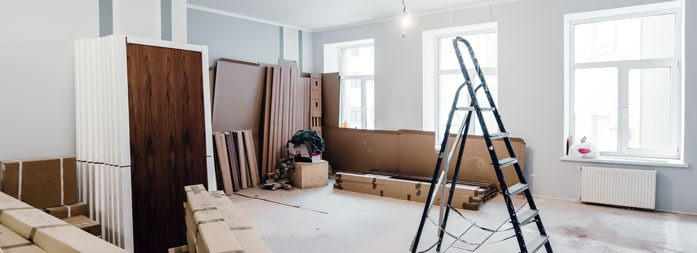
by Jeff Grandfield and Dale Willerton – The Lease Coach
Whether you’re a prospective, new, or an existing independent retailer, you shouldn’t rush to sign your initial commercial lease or lease renewal. You need to think ahead to any construction required on your premises. One of the best times to address any construction and/or renovation plans (even something as simple as new carpeting or a fresh coat of paint) is while negotiating the initial lease or prior to your lease renewal. Many tenants do not consider that a landlord may contribute to renovations of an existing business and may be willing to cover the costs of these repairs or upgrades to your store as a means to motivate you to renew your lease and remain in his property as a rent-paying tenant.
As we explain in our book, Negotiating Commercial Leases & Renewals FOR DUMMIES, there is more to consider and remember. Before completing any renovations or repairs to the property yourself, it’s vital for independent retail tenants to understand that landlords often reserve the right to pre-approve all design and construction to be done by the tenant for a couple of reasons:
- It’s often the landlord’s tenant allowance money being spent on those leasehold improvements. The landlord wants to ensure if at all possible that the improvements being made to the premises can live on and be used by the next tenant should you not stay for more than one lease term or your business fails.
- It’s the landlord’s property and the landlord rightfully deserves to know whether your construction plans include penetrating a roof membrane or making other structural changes. If your design plans reveal that you’ll be using a disproportionate amount of utilities, the landlord may also want some input on that (which is completely understandable).
Furthermore, in some cases, your lease agreement or renewal may include a review fee for looking at and approving the tenant’s plans, which will include renovations throughout the lease term. As with many other terms and conditions in this agreement, this fee is completely negotiable prior to signing the lease or as part of a lease renewal. With one client, we remember that the landlord was trying to charge the tenant $1,500 to review their renovation plans. We negotiated to eliminate this expense entirely as this was not a brand-new buildout and the plans were mostly cosmetic in nature.
The landlord’s work as listed in an offer to lease, formal lease agreement, and/or a lease renewal document should state very specifically any improvements to the property or the premises that the landlord will do (typically at their expense), This can be as basic as installing an HVAC system on the roof so the tenant has warm and cool air, right down to installing toilets, doing electrical work, plumbing, and/or completing other basic work. You can even negotiate to have the landlord turnkey the premises – taking most of the hassle, anxiety, or heartache out of the construction process for the tenant.
On a new lease, the lease agreement should also address the condition of the premises. If no or little landlord’s work is being done, you can receive the premises as is, meaning that you’re not left to pay for removal of all the previous tenant’s leasehold improvements that you don’t want.
Any work that the landlord isn’t doing should be stated as tenant’s work. Typically, this work is at your expense with the landlord’s approval. The more extensive the lease deal and buildout, the more likely the list of landlord and tenant’s work is included in a separate exhibit attached to the offer, letter of intent (LOI), or the lease renewal agreement.
Some landlords are casual about what leasehold improvements the tenant plans for the space. If it’s a fairly conventional type of business, the tenant’s work list may be relatively short. Make sure that you include all plumbing, electrical, air distribution, lighting, partition walls, and even window coverings. Even if all you want to do is to pop up a sign and open for business, the landlord may require you to replace the floor coverings and paint. Make sure that you’re prepared to complete all the tenant’s work on your list or the landlord may force you to do so later.
Finally, do not overlook negotiating a period of time or fixturing period, free of rent, to complete your renovations. Keep in mind that these can often take much more time than you anticipate. Even on a lease renewal where a major renovation requires the closure of your business, the landlord may provide a fixturing period as part of your lease renewal negotiations.
 For a complimentary copy of our CD, Leasing Do’s & Don’ts for Commercial Tenants, please email JeffGrandfield@TheLeaseCoach.com.
For a complimentary copy of our CD, Leasing Do’s & Don’ts for Commercial Tenants, please email JeffGrandfield@TheLeaseCoach.com.
 Dale Willerton and Jeff Grandfield – The Lease Coach are Commercial Lease Consultants who ; while work exclusively for tenants. Dale and Jeff are professional speakers and co-authors of Negotiating Commercial Leases & Renewals FOR DUMMIES (Wiley, 2013). Got a leasing question? Need help with your new lease or renewal? Call 1-800-738-9202, or visit www.TheLeaseCoach.com.
Dale Willerton and Jeff Grandfield – The Lease Coach are Commercial Lease Consultants who ; while work exclusively for tenants. Dale and Jeff are professional speakers and co-authors of Negotiating Commercial Leases & Renewals FOR DUMMIES (Wiley, 2013). Got a leasing question? Need help with your new lease or renewal? Call 1-800-738-9202, or visit www.TheLeaseCoach.com.
